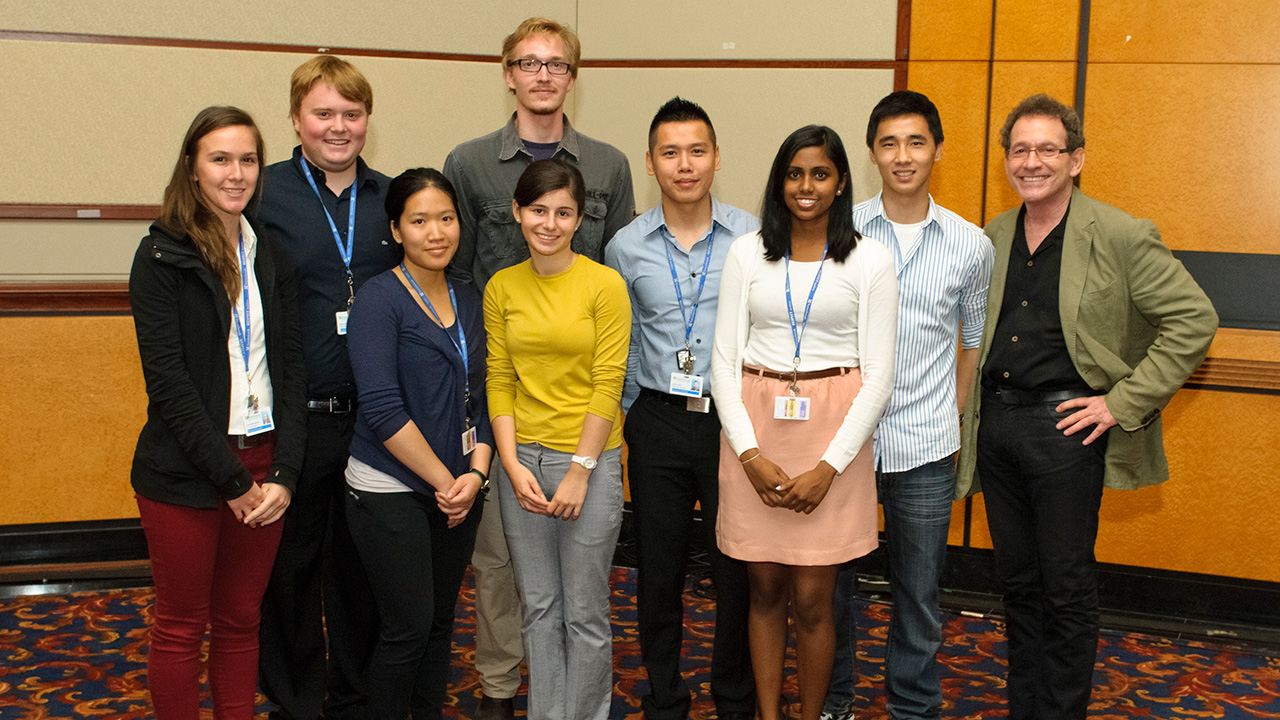The Next Generation of Scientists
By Eleni Kanavas
After spending the last four months hard at work in the labs at Sunnybrook Research Institute (SRI), a group of summer students had the chance to share the results of their projects and compete for a cash prize.
On August 16, 2012, SRI hosted its annual Best Summer Research Project competition. At 52 entries, this was the largest competition in recent years. Undergraduate students from universities across Canada presented their hospital-based experiments to judges and onlookers through posters that illustrated and explained their research methods, observations and results.
This year's competition represented SRI's new research platforms. The entries included 17 from biological sciences, 25 from evaluative clinical sciences and 10 from physical sciences. Judges from each platform selected the winners. Three first-place awards were given to the top student from each of the platforms. In addition, there were second-place and third-place winners owing to the number of participants.
Dr. Michael Julius, vice-president of research at Sunnybrook and SRI, congratulated the students on their accomplishments and announced the winners at the end of the event. "You are an inspiration to all of us, and we have had a wonderful time hosting you this summer," he said.
Through hands-on research training, the summer program gives students an opportunity to conduct intensive research in the labs and be mentored by SRI scientists. The placements aim to give university students a unique research experience that promotes the postgraduate environment as a prospective career in science.
A total of 85 students were hired this year through research administration. The summer employment term runs from May 1 to August 31, 2012.
As part of the studentship, SRI hosts an orientation, a weekly seminar series that showcases the research of scientists from across the platforms and programs, and the end-of-summer poster competition.
Michael Hynes, who was supervised by Dr. Stuart Foster, placed first in physical sciences for his project, "Intravascular imaging using frequency domain photoacoustics."
The fourth-year Queen's University student has worked in Foster's lab for the past two summers. He is completing a dual degree in engineering physics and computer science. His project focused on developing a combined intravascular ultrasound and photoacoustics imaging catheter.
First-place winners received $500 and individualized awards. Their names will be engraved on display plaques at SRI. Second-place winners received $300, and third-place winners received $200, both in addition to receiving a certificate of excellence.
Other award winners include:
First place:
- Ryan Sless (evaluative clinical sciences, supervised by Dr. Stephen Fremes): "The impact of diabetic status on long-term coronary artery bypass graft patency: insights from the radial artery patency study (RAPS)."
- Kristiana Xhima (biological sciences, supervised by Dr. Isabelle Aubert): "Effects of focused ultrasound on glial cell activation in a mouse model of Alzheimer's disease."
Second place:
- Yanbo Guo (biological sciences, supervised by Dr. Isabelle Aubert): "Characterization of an Alzheimer's disease model mouse and a cholinergic model mouse."
- Karen Lien (evaluative clinical sciences, supervised by Dr. Richard Swartz): "The DOC study: simple post-stroke screening for depression, obstructive sleep apnea and cognitive impairment."
- Anna Mersov (physical sciences, supervised by Dr. Bradley MacIntosh): "Effect of sample size on the sensitivity of a non-parametric permutation-based approach in detecting regionalized perfusion difference for a simulated clinical case-control ASL study."
Third Place:
- Perakaa Sethukavalan (evaluative clinical sciences, supervised by Dr. Andrew Loblaw): "Improved wait time intervals for prostate cancer patients in a multi-disciplinary rapid diagnostic unit compared to a community-based referral pattern."
- John Tran (biological sciences, supervised by Dr. Miles Johnston): "Investigating the susceptibility of lymphatic endothelial cells to a TGF-B1 mediated endothelial to mesenchymal transition: relevance to breast cancer-related lymphedema."
Julius also encouraged the students to apply for the Sunnybrook Prize. The competition is open to undergraduate students who are in their final year of study at a Canadian university in the physical sciences or engineering disciplines and have an interest in biomedical research. Ten finalists will be invited to SRI to present their work and a $10,000 cash prize will be awarded to the top finalist on January 4, 2013.
Previous years' summer research project competition recaps: 2011, 2010, 2009, 2007, 2006 and 2004.






